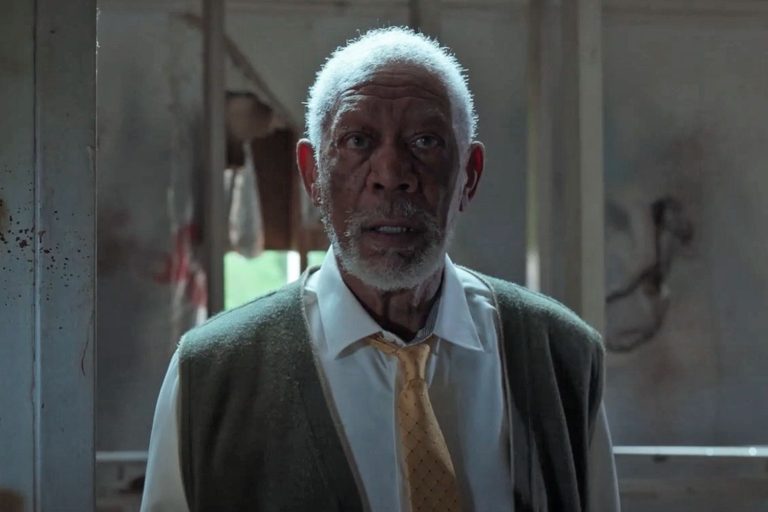It never ceases to amaze me how many movies with a large ensemble cast in a familiar setting and dealing with personal issues that might interconnect owe a lot to Quentin Tarantino’s “Pulp Fiction.” Emilio Mauro’s directorial debut, “Another Day in America,” opens with a decisive incident: Tracy (Alexis Knapp), head of HR at a big corporate office, fires an employee due to sexist tweets he wrote over a decade ago.
Tracy listens to the employee’s castigations, which devolve into vehement rebuttals, before screaming for him to get out of the room. The scene ends with a freeze frame of Tracy pointing at the door before cutting to a black screen, the movie’s name appearing as a tune eerily similar to Dick Dale’s Misirlou plays in the background. It’s an interesting, albeit simple, premise: following a diverse group of individuals within a corporate office throughout the day in a post-pandemic American society. It is an interesting experimental case study because this depiction doesn’t require an outside influence or a screenplay-induced domino effect to produce something absurd. The lines drawn between differing generations are already pronounced.
In a world where social media is more favored by the younger populace, where education is accessible enough that knowledge is easy enough to earn and easier to arm and use, there comes a definite and essential sense of arrogance atop the one already present within the youth. You compound that with the emphasis on “cancel culture,” or the presence of accountability for one’s actions, and it becomes a powder keg.
To give credit to Mauro, this is a mostly conversational piece amidst different office spaces for the majority of its runtime. Mauro chooses to create archetypal characteristics within all of his central characters and allow flourishes to build one on top of the other. Scott Miller (Oliver Trevena) is acknowledged to be broken after realizing that the woman he is carrying a torch for, Erin Gleason (Daphne Blunt), might have hooked up with Chris Bariss, one of the major clients of the company.
But the reason for his descent into depression and self-pity becomes the weapon for Greg Stout (Ritchie Coster), who believes that this affair Erin is conducting with the client is grounds for firing, which Tracy disagrees with. Amidst all of that, there is the subplot of Joe Carlton, who is worried that he might have gotten carried away in the middle of the party the previous night and might have impregnated Shirley Sherman. “Might” is the operative word because he is unable to recall whether he had been wearing protection, and instead, he chooses to ask Sherman about her political leanings to understand her views about unplanned pregnancy.
It’s not to say that Mauro isn’t hitting incisive points here. The conversation Carlton has with Sherman regarding pro-life and religion shows how much policies and politics become intertwined in regular conversations. There are also moments, especially for the character of Tracy, where her determination regarding managing an inclusive and diverse department and her insistence on maintaining political correctness almost paint her as the villain until she is given a moment to shine and explain her perspective.

This is where Mauro could be accused of playing it safe and trying to appease both sides of the political spectrum. But what Mauro is ultimately trying to do is introduce a dialogue and open lines of communication. These lines could range from having clarity within a solely sexual relationship to clarity and openness in understanding a generational perspective to clarity in realizing why diversity is essential, and the statement that being color or gender-blind in favor of plain old business is perhaps a convenient excuse.
Mauro, through the cubicles and closed doors and the cliques and the face masks, reveals how social media and the creation of echo chambers have robbed us of the ability to communicate or even entertain a shred of nuance. These are not new instances, and all characters aren’t given enough complexity. There is even a moment where Scott breaks the fourth wall to go on a tirade about the perils of social media, of hashtags, of being overwhelmed in a world that doesn’t understand him, and that is the moment where you feel Mauro hammering his points just a tad bit too hard, going slightly overboard towards one end of the political spectrum rather than choosing to focus on connecting the different factions within the country.
Even Erin’s character, while given enough moments in the spotlight, doesn’t rise beyond the typical depiction in her introduction, with only Tracy allowing us to show a different side of Erin while explaining her stance of not choosing to fire her to Greg. It feels like a screenwriting hack for explaining the newer wrinkles of a character without giving her screen time to express them on her own.
“Another Day in America,” however, truly is about America; its eternal love story with guns and gun violence becomes the major re-jiggering. It is shocking and even baffling to a certain extent, considering how that subplot is introduced, but that is no less baffling than some of the banter Mauro writes, which feels less clever and more filling up the space for comedic moments.
However, even with its mostly hokey ending, Mauro does manage to capture the confusion and ever-widening gulf a country is experiencing within its citizenry, as the pandemic only forced people to become more steadfast in their beliefs rather than fostering openness. It’s not incorrect to state that Mauro doesn’t posit any definite solution, but it would be wrong to suggest he wasn’t successful in depicting the sociological issues rather well, interlacing the inherent narcissism of humanity addicted to validation either through clicks, likes, shares, or through promotions and short-lived relationships.




![Pink [2016] : Colouring them in shame](https://79468c92.delivery.rocketcdn.me/wp-content/uploads/2016/09/PINK2-768x351.jpg)

![Swallowed [2022]: ‘Fantasia’ Review: The Kind Of Messy Queer Horror We Need](https://79468c92.delivery.rocketcdn.me/wp-content/uploads/2022/07/Swallowed-768x405.jpg)


